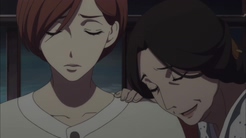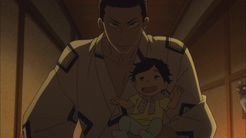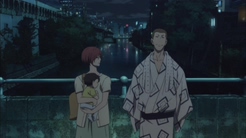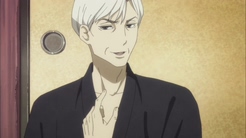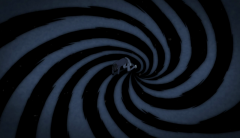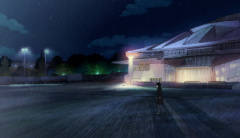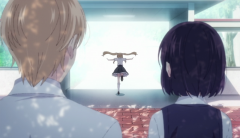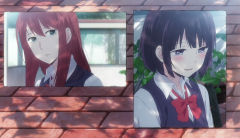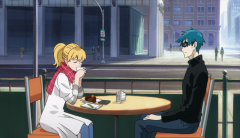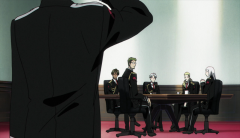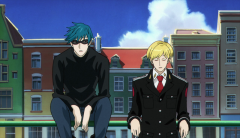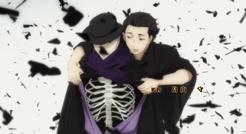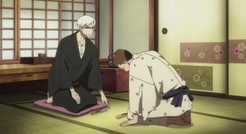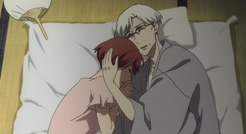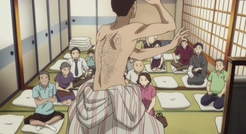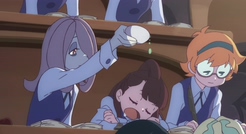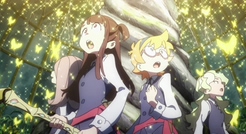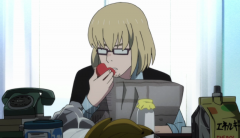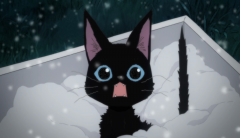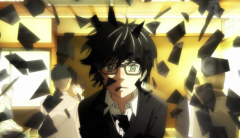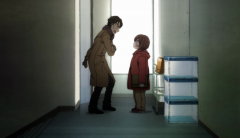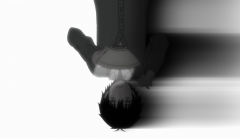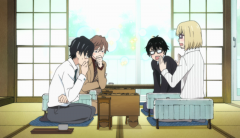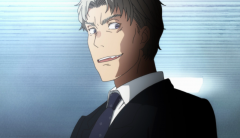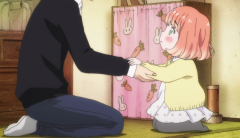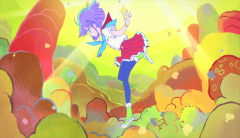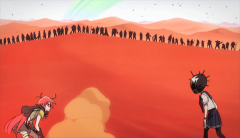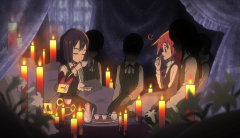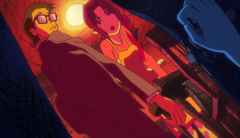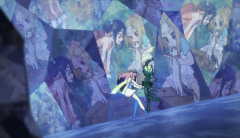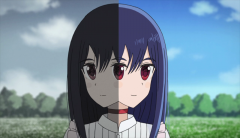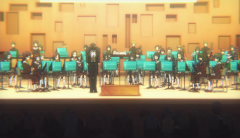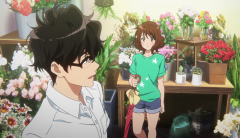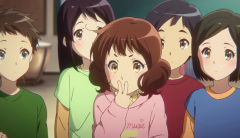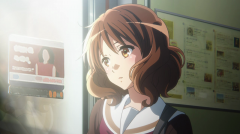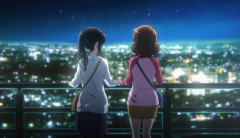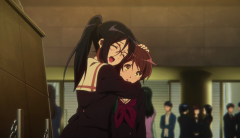I must admit that out of all the series I was blogging last year, Sound Eupho 2 was the one I’m saddest to see it ends; not because it was my absolute favorite anime last year, but because the sheer amount of their attention to details and their ridiculously quest for perfection are something that out of this world, in this day and age, which I will get to that later in my review. This is a sequel to Sound Eupho last year but I will keep the comparison to the first season to minimum in terms of quality because this season is great enough to be judged by its own.
The story is a direct continuation from the end of last season, as the Kitauji high school concert band just qualified from the qualifying round, now heading to Kansai region competition and later on, the National competition. Unlike the first season where the main dramatic events like Aio pulled out from the music club to focus on her study; the audition to choose the best players for the competition or the challenge to pick the lead trumpet arise and resolved around the development of the band club itself, the second season concentrates more on the band members’ personal issues. This change of focus is more apparent in the second half, when the show completely drops the band practice, even to the point of not showing the national performance at all. I understand this bold choice can cause disappointment to many fans who want to see the band in action, and moreover focus on individual character drama can cause the lack of cohesive theme; this shift of attention, on the other hand, also brings out some of the best character developments and intimate moments the show has ever achieved.
I will get to the negative part first. When the show concentrates more on character’s heightened drama, those dramas can be uneven and doesn’t add up much to the big picture. Two of this season’s acts for example: Yoroizuka and Reina act don’t play well for me because they have the exact opposite problems. Yoroizuka (the only character that I used by surname here, as this is how Kumiko refers her) is a secondary character who was suddenly given the spotlight and while her final confrontation with Yuuko and Nozomi was effective, the drama was resolved too quickly, Yoroizuka changed so fast that I personally don’t see her grow as natural at all. Reina’s affection to Taki-sensei grow to another level this season, but I’m not alone to say that this was the show’s weakest act because almost everyone can see the outcomes. That drama isn’t much to speak of to begin with; it’s a shame because Reina was my favorite character the first season and I’d like to see other kind of developments for Reina, any other development but this.
Moreover, sometimes it does feel like Sound Eupho stumbles around those dramas in order to “create the situation”; as a result sometimes the show loses its focus because it has to cover too many grounds (like in episode 6), other times some of the conflicts feel forced and calculated (of all time, Mamiko choose she decided to tell her parents to quit college on that stormy night, and “she quited because it has to be now”. Why?). While the Mamiko act actually turns out pretty great, those issues speak to the lack of single unified theme that made the first season so tightly constructed. The last issue, which was also the show’s biggest flaw, lied in the fact that when they focus too much on one set of characters for the drama, other cast members unfortunately don’t have much roles so all they do is hanging around and making the best out of little screen time they had. Reina, before reaching her act, serves as a shadow behind Kumiko; Shuichi becomes the unluckiest guy in the world and worst of all, Hazuki and Sapphire don’t have any development anymore, given that they are still billed as the lead characters.
In contrast, if anything, this season will be remembered as the season of Kumiko and Asuka. They are the heart and the soul of this season, and it’s a blessing to see how far both of them have matured in the end. Asuka has been one of the most complex character in Sound Eupho’s universe and the show did a damn fine job to underline her struggles with both her parental figures, as well as gradually peeling off the mask to reveal her true feeling inside. The most brilliant part of it was that she never lose her strong side at all, never in many moments we are allowed to see her vulnerable side, because it’s more that she becomes honest to herself, embrace herself to what she loves most and comes out even stronger than before. In additions, most of Asuka and Kumiko moments develop into the highlights of the season. When Asuka played that Sound Euphonium piece to Kumiko in episode 9, it was one of the best moments of the whole show, period. When Kumiko poured her heart out to convince Asuka to come back to the band, it was one of the most effective drama the show could ever committed. As the two getting closer and more honest to each other, it makes a whole lot sense that we have that final confrontation between them that warmly tied up this whole season together. This show indeed ends on a high note.
Kumiko also deserved to be one of the year’s best character here as she has changed a lot from timid and passive with no real passion into the one who is really honest to what she feels. Aside from her interaction with Asuka, her moments with her sister, while soft and never overly dramatic like other acts, feel all too real ans intimate on how siblings care about each other. The last few episodes when we follow her through her quiet tears on the train, her outbursts, her confessions were a joy to watch and each step she made feel like a natural progression. I have to give extra gratitude Tomoyo Kurosawa, the saiyuu of Kumiko, for delivering such a deadpan, plain but strangely distinctive voice of our main girl.
But what make Sound Eupho stand head above the rest of the crop lies in its production values. That 10-minute performance in episode 5 simply outperformed everything else I watched in recent years. KyoAni’s always known for their gorgeous designs and their attentive to make every little detail right, but this is just another level of insanity the more you get to know what they achieved. Almost every performance you heard in the show was correctly timed to their single notes (meaning that if you hear the character hits the notes onscreen, they were the right notes), the position of their fingers, their postures, even down to the preparation of the members before hitting the notes, were all accurate. Now imagine all of these in animation with a band of thirty something characters for the whole two seasons. I can’t even think how on earth one could achieve animating all that, let alone making it all flawlessly. They even go as far as making the echo of the announcement on the firework scene in the first episode, because they wanted it to be real (the city Uji is surrounded by mountains). No, something as insane as this don’t happen often, especially on TV-anime level, so to see it finally at the end of its road suddenly make me feel a little sad.
This second season is indeed a worthy follow up to the Sound Eupho the series. Just a bit of note that the score I’m giving above is for this second season alone, if I have to give a score for the whole series it would be 93/100. Sound Eupho is an install classic and for me is up there as one of KyoAni’s best works to date. As of this writing right now, there is one more novel about our Kitauji school that is more of a collection of short stories (like the real reason Aoi quit the band, or the story of Shuichi finally confesses to Kumiko) so I think OVAs will be the most possible outcomes. Otherwise we have the spin-off novels that focus on Azusa (Kumiko’s childhood friend) and her Rikka high school marching band and for now I think there’s a high chance that in the future KyoAni will return back to that universe by adapting this spin-off. Well, they better adapt it, or on that note, why not adapting Haruhi season 3?

